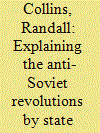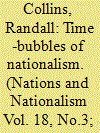| Srl | Item |
| 1 |
ID:
106345


|
|
|
|
|
| Publication |
2011.
|
| Summary/Abstract |
A major area of advance in social science in recent decades has been the state breakdown theory of revolution. This is part of a larger body of theory about the rise of the modern state and the crises that can befall it along the way. It is sometimes referred to as the military/fiscal theory of the modern state, and as a branch of that larger theory, the state-centered theory of revolution. Here I will link military/fiscal theory of the state to geopolitical theory. Military/fiscal theory shows us the central mechanism, both of state growth and state breakdown; these are proximate causes, and further back in the causal chain are geopolitical conditions. Geopolitics tends to be the primer mover in any particular historical sequence, what sets off the changes that eventually lead to state growth or breakdown.
|
|
|
|
|
|
|
|
|
|
|
|
|
|
|
|
| 2 |
ID:
114092


|
|
|
|
|
| Publication |
2012.
|
| Summary/Abstract |
The growth of modern nationalism can be attributed to structural causes, especially the growth of the strong bureaucratic state that penetrates society, creating cultural uniformity and national identity. But structurally based nationalism need not be very intense, or constant; even when institutionalised in periodic formal rituals, it can be routine, low in emotion - even boring. We need to explain sudden upsurges in popular nationalism, but also their persistence and fading in medium-length periods of time. Nationalist surges are connected with geopolitical rises and falls in the power-prestige of states: strong and expanding states absorb smaller particularistic identities into a prestigious whole; weaker and defeated states suffer delegitimation of the dominant nationality and fragment in sudden upsurges of localising nationalities. Passing from macro-patterns to micro-sociological mechanisms, conflict producing solidarity is a key mechanism: dramatic events focus widespread attention and assemble crowds into spontaneous 'natural rituals' - mass-participation interaction rituals, as distinct from formal rituals. Evidence from public assemblies and the display of national symbols following the terrorist attacks of 11 September 2001 (9/11) shows an intense period of three months, then gradual return to normal internal divisions by around six months. Spontaneous rituals of national solidarity are produced not only by external conflict but by internal uprisings, where an emotional upsurge of national identity is used to legitimate insurgent crowds and discredit regimes. Although participants experience momentary feelings of historic shifts, conflict-mobilised national solidarity lives in a 3-6-month time-bubble, and needs to institutionalise its successes rapidly to have long-term effects.
|
|
|
|
|
|
|
|
|
|
|
|
|
|
|
|